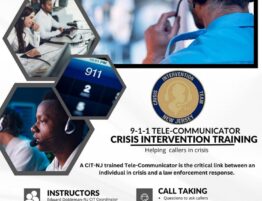
What does it mean to listen? Is it the passive process of taking in sound waves?
What about absorbing the context of words and the feelings behind them?
Listening has layers of meaning that stretch beyond the inert and into the active. As a CIT Officer, I often hear the term “Empathic Listening.” This touchstone concept in our training is “an active process to discern what a person is saying.”
When you focus on the person and engage with their message, you move from recognizing words to understanding the feelings and motivations behind them. This includes following up with questions if needed. It’s also about knowing when to stay silent while still maintaning officer safety.
Empathic Listening is a dynamic and compassionate process that calls for more than taking in someone else’s words. You’re communicating with that person as well. You’re showing that you care about them, their thoughts and feelings, and are willing to take the time to hear them out.
Listening with empathy fosters rapport that keeps Care, Welfare, Safety and Security vibrant and sets the stage for problem solving. Knowing the people in your community better helps you to recognize causes of behavior and find solutions.
We would all like to always know the right thing to say in any moment to give someone comfort and hope, to solve the problem, but we are only human and can’t understand and fix everything. Also, sometimes words can’t fix it.
I recall a story about a swim instructor told me. She said, one of the girls in her swim class was crying in the locker room. I didn’t know her well and wasn’t sure how to comfort her. I wondered if any of the other girls had made fun of her, if she felt self-conscious or frustrated, or if she wanted to be alone for a moment.
She stated she then took a breath and moved to the bench, giving the girl as much space as she could while still being close enough to talk. She sat for a few moments, and the girl didn’t say anything to her, but the girls crying lessened. After a while, the instructor stumbled through some words about how I’m here if you’d like to talk but it’s fine if you don’t or if you’d like me to leave. Then she asked, “Is there anything I could do to help?” The gril looked at her and paused, swiped the tears from her face, and gently shook her head. In that moment, the instructor stated all she could do was to let the girl know she cared by simply sitting with her.
Sometimes, letting someone know the depth of your empathy by being there, by being a sympathetic sounding board for their emotions, is all that’s needed for that moment. Rather than worrying over the right words, what if we focused on sharing our time and compassion?
Tips for Empathic Listening
1. Be nonjudgmental.
This isn’t always easy, but letting go of your own opinions frees you to focus on the other person’s perspective. Acknowledging a person’s views and emotions helps you to help them. This doesn’t mean you need to agree with everything the person says; it’s about letting them know you care, and they matter.
2. Give the person your undivided attention.
Remove distractions. Ensure that you have the time to spend with the person, and make sure no computers or other devices are between you and them. Giving them your full focus displays respect, and a person is more likely to stay calm when they feel respected.
3. Listen carefully (to feelings and facts).
Soak in the words as well as the larger view of that individual in that specific situation. Notice tone of voice, body language, and other clues to go beyond the words and gain insight into emotions.
4. Show that you are listening carefully.
Think about your non-verbal clues such as posture. Rember supportive body language like eye contact, nodding, and other signals is appropriate to advertise your attentiveness without interrupting.
5. Don’t be afraid of silence.
Sometimes all a person needs is to be heard or know you’re there. Pay attention to the context and quality of the silence before responding. The individual might be thinking about what to say next or may need a few silent moments to rein in emotions.
6. Restate and paraphrase.
If you speak, refer to the person’s words, ask questions, and clarify comments as needed. Keep that nonjudgmental and respectful spirit, and give the person time to respond. Remember, there is no script for Empathic Listening. Respond based on that person, situation, and moment.
7. Follow up or offer resources.
Check with the person to see if they have further questions or comments. Offer them resources that you have learned about in your CIT-NJ Center of Excellence Program.









